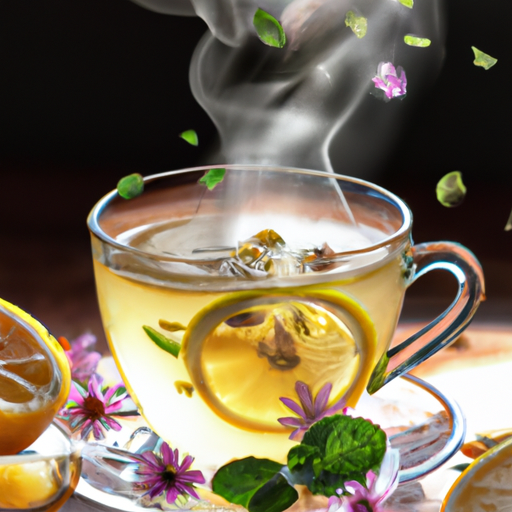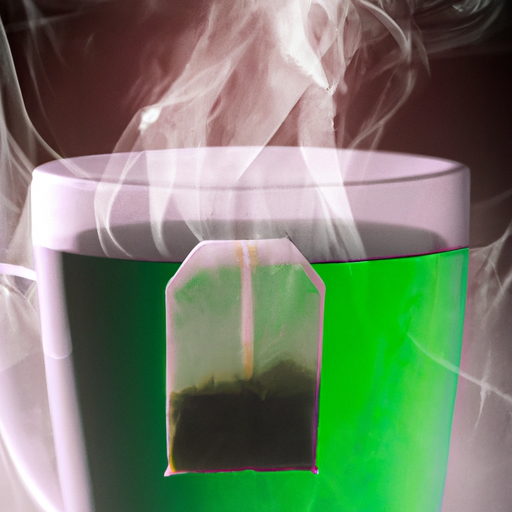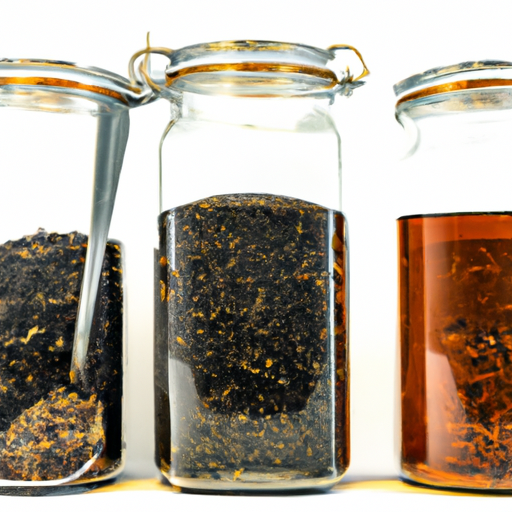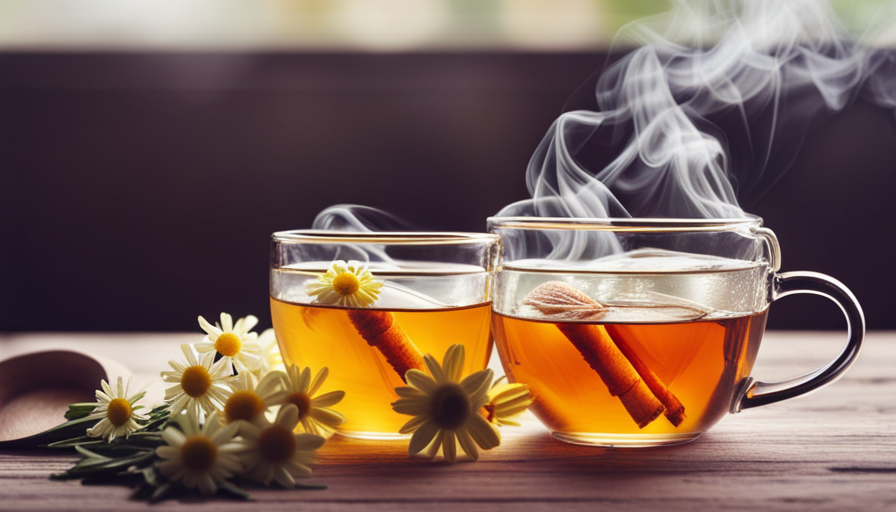I have always been intrigued by the process of crafting herbal tea. The unique combination of ingredients that fuse together to form a symphony of flavors and scents is truly captivating. When it comes to elevating the taste and health benefits of herbal tea, the options are limitless. From fruits and berries to spices and herbs, there are a plethora of elements that can elevate your tea experience. Whether you enjoy a fruity infusion or a bold and aromatic brew, there is a perfect blend just waiting to be uncovered.
In this article, I will explore the various ingredients you can add to herbal tea to enhance its taste and therapeutic properties. We will delve into the world of fruits and berries, spices and herbs, sweeteners, dairy or non-dairy milk, floral additions, nuts and seeds, and even flavor extracts. By understanding the unique characteristics of each ingredient, you can create your own personalized tea blends that cater to your specific tastes and health needs.
So, grab your favorite mug and join me on this journey of exploring the endless possibilities of herbal tea. Let’s unlock the secrets of nature’s bounty and create a truly delightful and nourishing beverage.
Key Takeaways
- Adding fruits and berries like oranges, lemons, strawberries, and blueberries enhances the taste of herbal tea and provides antioxidants and vitamins.
- Aromatic spices and herbs such as cinnamon, ginger, peppermint, and chamomile not only enhance the flavor of herbal tea but also offer various health benefits.
- Natural sweeteners like honey, agave syrup, maple syrup, stevia, and monk fruit sweetener can be used instead of refined sugar to sweeten herbal tea, each with their own unique benefits.
- Infusing herbal tea with floral elements like chamomile, lavender, and rose petals not only adds elegance to the tea but also provides therapeutic properties such as better sleep, stress relief, and improved digestion.
Fruits and Berries
Add some fresh fruits or berries to your herbal tea for a burst of flavor that’ll leave your taste buds craving for more! Not only do fruits and berries enhance the taste of your tea, but they also bring a myriad of health benefits.
Rich in antioxidants, vitamins, and minerals, these natural additives can boost your immune system, improve digestion, and even promote weight loss.
When it comes to incorporating fruits and berries into your herbal tea blends, the possibilities are endless. For a refreshing and invigorating blend, try adding slices of citrus fruits like oranges, lemons, or grapefruits. These fruits not only add a tangy flavor but also provide a dose of vitamin C.
If you prefer a sweeter twist, opt for berries such as strawberries, blueberries, or raspberries. These little powerhouses are packed with antioxidants that can help fight inflammation and protect against chronic diseases.
To get creative with your herbal tea, experiment with different flavor combinations. For a tropical twist, add pineapple chunks or slices of mango to your tea. You can even mix fruits and berries together for a delightful medley of flavors.
So go ahead and elevate your herbal tea experience with the goodness of fruits and berries.
Now, let’s move on to the next section about spices and herbs.
Spices and Herbs
Enhance the flavor of your brew by incorporating a delightful blend of aromatic spices and herbs, as the saying goes, ‘Variety is the spice of life.’ Adding spices and herbs to your herbal tea not only enhances its taste but also offers a plethora of health benefits.
Here are some wonderful options to consider:
-
Cinnamon: Known for its warm and sweet flavor, cinnamon adds a comforting touch to herbal tea. It’s also believed to have anti-inflammatory and antioxidant properties.
-
Ginger: With its spicy and invigorating taste, ginger adds a refreshing kick to your tea. It’s known to aid digestion and reduce nausea, making it a perfect addition to herbal tea after a heavy meal.
-
Peppermint: Known for its cooling and soothing properties, peppermint adds a refreshing twist to your tea. It can help relieve indigestion and promote relaxation.
-
Chamomile: This delicate herb has a gentle floral flavor that brings a sense of calmness. Chamomile tea is known for its soothing properties, making it a perfect choice for winding down before bedtime.
Incorporating these aromatic spices and herbs not only elevates the taste of your herbal tea but also provides various health benefits.
Now, let’s delve into the next section about ‘sweeteners’ and explore how they can complement your brew.
Sweeteners
When it comes to sweetening herbal tea, there are several options that I find particularly appealing. First, I love using honey or agave syrup because they add a natural sweetness while also providing beneficial enzymes and antioxidants.
Another favorite of mine is maple syrup, which adds a rich and earthy flavor to the tea.
Lastly, for those looking for a low-calorie option, stevia or monk fruit sweetener can be great alternatives. They are derived from plants and have a minimal impact on blood sugar levels.
Honey or agave syrup
Try sweetening your herbal tea with a drizzle of honey or a touch of agave syrup for a delightful burst of natural sweetness. Both honey and agave syrup are popular alternatives to refined sugar, each with its own unique qualities. Honey, a natural sweetener produced by bees, contains trace amounts of essential minerals and antioxidants, providing potential health benefits such as boosting immunity and soothing sore throats. Agave syrup, derived from the agave plant, has a low glycemic index, making it a suitable option for those managing their blood sugar levels. It also contains certain beneficial compounds, including fructans that act as prebiotics, promoting a healthy gut. While both options offer a natural and healthier alternative to traditional sweeteners, it’s important to choose according to personal taste preference and nutritional needs. In the next section, we will explore the wonders of maple syrup as another flavorful addition to your herbal tea.
Maple syrup
Indulge in the golden sweetness of maple syrup as it cascades through your cup like a river of liquid sunshine. When it comes to adding flavor to herbal tea, maple syrup is a delightful alternative to honey or agave syrup. Not only does it provide a unique and rich taste, but it also offers various health benefits.
Maple syrup is a natural sweetener that contains essential minerals like manganese, zinc, and calcium. It’s also rich in antioxidants that can help fight inflammation and protect against cell damage. Additionally, maple syrup has a lower glycemic index compared to other sweeteners, making it a great option for those watching their blood sugar levels.
As we transition to the next section discussing stevia or monk fruit sweetener, we can explore their distinct qualities in enhancing herbal tea.
Stevia or monk fruit sweetener
Satisfy your sweet tooth with the natural sweetness of stevia or monk fruit sweetener, and experience a guilt-free way to enhance your favorite beverages. These plant-based sweeteners offer a healthier alternative to traditional sugar, without the empty calories or negative effects on blood sugar levels.
Stevia, derived from the leaves of the Stevia rebaudiana plant, is known for its zero-calorie content and potential benefits such as improved insulin sensitivity and reduced blood pressure.
Monk fruit sweetener, made from the extract of monk fruit, is also calorie-free and has been used for centuries in traditional Chinese medicine for its antioxidant properties.
Incorporate these sweeteners into your herbal tea for a delightful taste without the guilt. Explore recipes that combine monk fruit sweetener with other natural ingredients to create a unique flavor profile.
Now, let’s move on to the next step and discuss the addition of dairy or non-dairy milk to your herbal tea.
Dairy or Non-Dairy Milk
Although it may seem counterintuitive, adding a splash of dairy or non-dairy milk to your herbal tea can create a surprisingly delightful and unexpected flavor combination.
While herbal teas are typically enjoyed on their own, the addition of dairy alternatives such as almond milk, coconut milk, or oat milk can enhance the taste and texture of the beverage. These dairy alternatives not only provide a creamy and velvety mouthfeel but also offer their own unique health benefits.
Almond milk, for example, is rich in vitamin E and contains healthy fats that can promote heart health. Coconut milk is known for its antimicrobial properties and can support the immune system. Oat milk, on the other hand, is a great source of dietary fiber and can help regulate digestion.
By incorporating these dairy alternatives into your herbal tea, you not only introduce new flavors but also reap the benefits of their nutritional profiles.
Transitioning to the subsequent section about floral additions, infusing your herbal tea with floral elements can further elevate its taste and aroma.
Floral Additions
Enhance the flavor and aroma of your brew by infusing your favorite herbal tea with a burst of delightful floral additions. Adding edible flowers to your tea not only creates a visually appealing beverage but also introduces a range of health benefits.
Edible flowers like chamomile, lavender, and rose petals not only add a touch of elegance to your tea, but they also contribute to its therapeutic properties. Chamomile flowers, for instance, are known for their calming effects and can help promote better sleep and reduce anxiety. Lavender flowers have a soothing aroma that can alleviate stress and improve relaxation. Rose petals, on the other hand, are rich in antioxidants and can support healthy skin and digestion.
Incorporating these edible flowers into your herbal tea can elevate your tea-drinking experience while providing additional health benefits.
Moving on to the next section about nuts and seeds, they can be excellent additions to herbal tea.
Nuts and Seeds
When it comes to adding a little extra crunch and nutrition to my herbal tea, I often turn to nuts and seeds. Crushed almonds or walnuts not only provide a satisfying texture, but they also offer a healthy dose of omega-3 fatty acids and antioxidants.
Chia seeds or flaxseeds are another great option, as they’re packed with fiber, protein, and essential fatty acids.
And let’s not forget about pumpkin or sunflower seeds, which add a delightful nutty flavor and are rich in vitamins, minerals, and antioxidants.
Adding these nuts and seeds to my herbal tea not only enhances the taste, but also boosts the overall nutritional value of my beverage.
Crushed almonds or walnuts
You can add a handful of crushed almonds or walnuts to your herbal tea for a delightful nutty flavor. Not only do these nuts enhance the taste, but they also offer numerous nutritional benefits.
Almonds are packed with healthy fats, protein, and fiber, which can help promote a feeling of fullness and aid in digestion. They’re also a rich source of vitamin E, magnesium, and antioxidants, which support overall health and wellbeing.
On the other hand, walnuts are known for their high omega-3 fatty acid content, which is beneficial for heart health. They also contain antioxidants and minerals like copper and manganese.
If you’re looking for alternative options, chia seeds or flaxseeds are excellent choices. These seeds are rich in omega-3 fatty acids, fiber, and protein. They also provide essential vitamins and minerals, including calcium, iron, and magnesium. Incorporating chia seeds or flaxseeds into your herbal tea not only adds a pleasant texture but also boosts its nutritional value.
Chia seeds or flaxseeds
To incorporate chia seeds or flaxseeds into your drink, simply sprinkle a handful of these nutrient-rich seeds into your favorite warm beverage. Chia seeds and flaxseeds are both excellent additions to herbal tea, providing a plethora of health benefits. Let’s compare the two to see which is better for your herbal tea routine.
| Chia Seeds | Flaxseeds | |
|---|---|---|
| Nutritional Value | High in omega-3 fatty acids, fiber, and antioxidants | Rich in omega-3 fatty acids, lignans, and fiber |
| Taste | Mild, nutty flavor | Earthy, nutty flavor |
| Texture | Gel-like consistency | Slightly crunchy texture |
Chia seeds and flaxseeds are both great options, but chia seeds have a higher omega-3 fatty acid content and provide a gel-like consistency when soaked, making them an ideal choice for herbal tea. Now, let’s explore the benefits of incorporating pumpkin or sunflower seeds into your tea routine.
Pumpkin or sunflower seeds
Chia seeds and flaxseeds are common additions to herbal tea, but have you ever considered adding pumpkin or sunflower seeds? These nutrient-dense seeds can provide a delightful twist to your tea experience.
Whether you choose roasted or raw, these seeds bring their unique flavors and health benefits to your brew. Roasted pumpkin seeds add a rich, nutty taste, while raw sunflower seeds offer a mild, earthy flavor. Both seeds can be seasoned with your favorite herbs and spices or enjoyed plain for a more subtle taste.
Pumpkin seeds are packed with vitamins, minerals, and antioxidants, promoting heart health and supporting immune function. Sunflower seeds, on the other hand, are a great source of healthy fats and vitamin E, promoting skin health and reducing inflammation.
Now, let’s explore the world of flavor extracts and discover how they can elevate your herbal tea experience.
Flavor Extracts
Adding flavor extracts to your herbal tea can enhance the taste and create a more enjoyable drinking experience. Not only do flavor extracts add a burst of flavor to your tea, but they also provide various health benefits.
Here are some flavor combinations and their associated benefits to consider when adding extracts to your herbal tea:
-
Peppermint extract: Known for its refreshing and cooling properties, peppermint extract can add a minty flavor to your tea. It’s also believed to aid in digestion and relieve headaches.
-
Vanilla extract: With its sweet and comforting aroma, vanilla extract can add a touch of warmth to your herbal tea. It’s known for its calming effects and may help reduce anxiety and promote relaxation.
-
Lemon extract: Adding a few drops of lemon extract can give your tea a tangy and citrusy flavor. Lemon extract is known for its detoxifying properties and can help boost your immune system.
-
Lavender extract: Known for its soothing and floral aroma, lavender extract can add a subtle and relaxing flavor to your tea. It’s believed to promote relaxation and improve sleep quality.
-
Ginger extract: Adding ginger extract to your tea can provide a spicy and warming flavor. Ginger is known for its anti-inflammatory properties and may help alleviate nausea and improve digestion.
By experimenting with different flavor combinations and incorporating these extracts into your herbal tea, you can create a personalized and beneficial beverage that suits your taste preferences and health needs.
Frequently Asked Questions
Are there any fruits or berries that should not be added to herbal tea?
Certain fruits and berries, such as citrus fruits and berries high in antioxidants, can enhance the flavor and provide additional health benefits when added to herbal tea. However, some fruits may alter the taste or have adverse effects on the tea’s properties.
Can I use fresh herbs and spices instead of dried ones?
When using fresh herbs and spices in herbal tea, there are both pros and cons. Fresh ingredients have a more vibrant flavor and aroma but may spoil faster. Dried ingredients, on the other hand, have a longer shelf life but may lack some of the fresh qualities.
What are some alternative sweeteners that can be used in herbal tea?
When it comes to alternative sweeteners for herbal tea, the possibilities are endless! From the rich, caramel-like taste of stevia to the floral notes of lavender honey, there are countless flavor combinations waiting to be discovered.
Is it possible to use non-dairy milk alternatives such as almond or soy milk in herbal tea?
Using non-dairy milk alternatives like almond or soy milk in herbal tea can enhance flavor and provide a creamy texture. Pros include added nutrients, while cons may include potential allergies or taste alterations.
Are there any nuts or seeds that are commonly added to herbal tea for additional flavor or health benefits?
Adding nuts and seeds to herbal tea can enhance both flavor and health benefits. For example, almonds provide a nutty taste and are packed with vitamin E, while chia seeds offer omega-3 fatty acids and fiber.
Conclusion
In conclusion, herbal tea can be enhanced with a variety of ingredients to elevate its flavor and add nutritional benefits. By incorporating fruits and berries, such as lemon or blueberries, you can infuse your tea with a burst of tangy sweetness. Spices and herbs like ginger or mint can provide a refreshing and aromatic twist. Sweeteners like honey or stevia can satisfy your cravings without compromising your health. Adding a splash of dairy or non-dairy milk can create a creamy texture. Floral additions like lavender or chamomile can offer a soothing and calming experience. Nuts and seeds can provide a crunchy and nutritious element. Lastly, flavor extracts like vanilla or almond can lend a hint of indulgence to your cup. With these various options, the possibilities’re endless, and your herbal tea can truly be a delightful and holistic experience, leaving you feeling rejuvenated and nourished.










